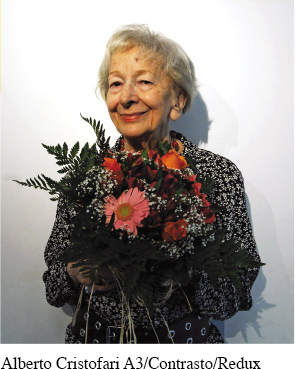10.9
Utopia
Wisława Szymborska

Translated by Stanisław Baran´czak and Clare Cavanagh
Wisława Szymborska [vis-
891
Island where all becomes clear.
Solid ground beneath your feet.
The only roads are those that offer access.
Bushes bend beneath the weight of proofs.
5 The Tree of Valid Supposition grows here
with branches disentangled since time immemorial.
The Tree of Understanding, dazzlingly straight and simple,
sprouts by the spring called Now I Get It.
The thicker the woods, the vaster the vista:
10 the Valley of Obviously.
If any doubts arise, the wind dispels them instantly.
Echoes stir unsummoned
and eagerly explain all the secrets of the worlds.
On the right a cave where Meaning lies.
15 On the left the Lake of Deep Conviction.
Truth breaks from the bottom and bobs to the surface.
Unshakable Confidence towers over the valley.
Its peak offers an excellent view of the Essence of Things.
For all its charms, the island is uninhabited,
20 and the faint footprints scattered on its beaches turn without exception to the sea.
As if all you can do here is leave
and plunge, never to return, into the depths.
Into unfathomable life.
Understanding and Interpreting
How does Wisława Szymborska describe the island of “Utopia”? What certainties does it ensure?
Why is Utopia “uninhabited” (l. 19)? Why is it a place where “all you can do here is leave” (l. 22)?
What is the difference between the “Tree of Valid Supposition” (l. 5) and the “Tree of Understanding” (l. 7)?
How might this poem be interpreted as a commentary on the reading of poetry, particularly the desire to find a single, clearly defined meaning?
Analyzing Language, Style, and Structure
What does the sea represent in this poem? What other elements of the landscape of Szymborksa’s utopia are symbolic? Discuss what at least two features of the landscape symbolize.
How does Szymborska achieve an ironic tone? Cite three different strategies with lines and passages to support your choice.
What is the argument Szymborska makes in this poem? Outline her claim and the evidence she provides to support it.
892
Connecting, Arguing, and Extending
An allegory is a story, poem, or picture that can be interpreted to reveal a hidden meaning, typically a moral or political one. To what extent is “Utopia” an allegory of the former Communist regime in Szymborska’s home country of Poland? You may need to research the political situation in Poland at the time the poem was written.
The following question was posed by the Polish magazine Autoportret to a group of “Polish and foreign intellectuals” that included philosophers, historians, social scientists, architects, and the poet Wisława Szymborska: “Is a crisis of utopia and utopian thinking underway? If so, what are the reasons [. . .] and if no, what can be the source of contemporary utopia?” While the others responded with fairly lengthy prose explanations, Szymborska simply submitted her poem. How does the poem respond to the questions?
Using the same tone that Szymborska does in “Utopia,” or a similarly ironic one, write a poem titled “Dystopia.” Remember: you are not necessarily writing your own opinion but modeling both style and content on the viewpoint of Szymborska in her poem.
Which of the following quotations most closely resembles the ideas in Szymborska’s poem “Utopia”? Explain your response with specific reference to the poem.
[I]n Utopia, where every man has a right to everything, they all know that if care is taken to keep the public stores full no private man can want anything; for among them there is no unequal distribution, so that no man is poor, none in necessity; and though no man has anything, yet they are all rich; for what can make a man so rich as to lead a serene and cheerful life, free from anxieties. —Thomas More, British philosopher and statesman
By their very nature utopias are static. They hate change because it’s a direct challenge to their fantasy of perfection. —Paul McAuley, British science fiction author
Nearly all creators of Utopia have resembled the man who has toothache, and therefore thinks happiness consists in not having toothache. [. . .] Whoever tries to imagine perfection simply reveals his own emptiness. —George Orwell, British author